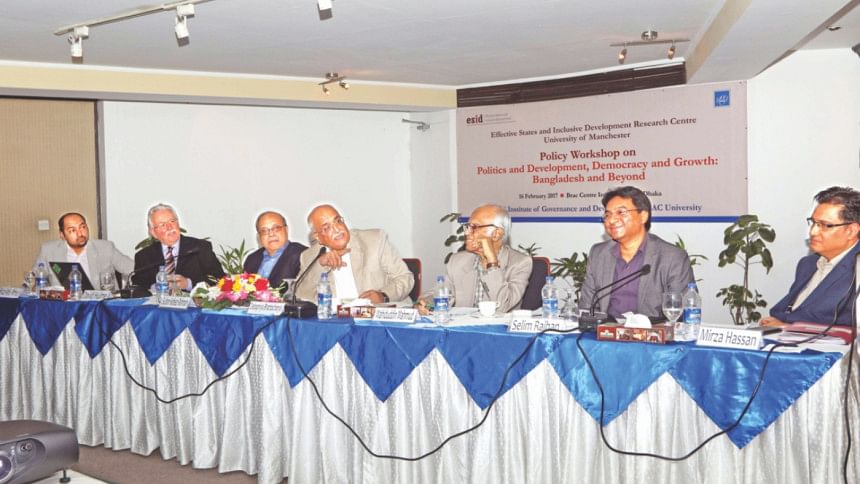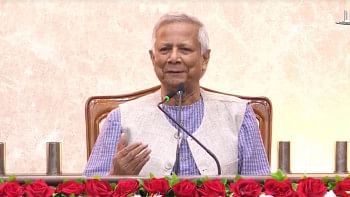Economy grows despite weak institutions: analysts

Bangladesh has been able to achieve steady economic growth despite weakness of many institutions.
Analysts at a policy workshop yesterday said this growth has been possible because of growth enhancing governance characterised by factors such as de-facto rent-sharing.
But a fair, credible and contestable election every five years will act as a deterrent to rent-seeking as the system helps make lawmakers accountable, they added.
The existing trend in the growth rate has been possible in Bangladesh because of a reasonably robust form of growth-enhancing governance, which aims to ensure growth in any way, even using corruption or even using bad laws, said Mirza Hassan, adjunct fellow of Brac Institute of Government and Development at Brac University, who presented a paper at the day-long policy workshop.
“These are characterised by de facto rent sharing,” he said, adding that the rents are just privileges.
Brac Institute of Government and Development (BIGD), Brac University and the UK-based research centre Effective States and Inclusive Development (ESID) jointly organised the event -- Politics and development, democracy and growth: Bangladesh and beyond -- at Brac Centre Inn.
Co-authored by Selim Raihan, a professor of the economics department at University of Dhaka, the paper explored the conditions of the political economy that allowed steady growth of Bangladesh.
Raihan, citing the pattern of structural changes, said the share of agriculture in GDP has gone down, while that of industry has increased. The share of services has also increased quite a lot, he added.
Economist Professor Wahiduddin Mahmud said the anticipation of periodic, fair and contestable elections will help ensure accountability of lawmakers and candidates. In that case, the regime knows that if it crosses an acceptable limit of rent-seeking, it will be dislodged, he added.
“Even in the constituencies, when you distribute privileges, the member of parliament knows that there will be credible elections, and you will have to combine the distribution of privilege, patronage politics with some real public goods,” he said.
Debapriya Bhattacharya, distinguished fellow of Centre for Policy Dialogue, said elites get accountable at least once in five years through credible and contestable elections.
Policy reforms and liberalisations since 1980 facilitated growth of the Bangladesh economy. But the scope of rent-seeking still remains, he added, citing the scope of licensing in the banking sector, telecom and IT and even ocean-going ships.
Kazi Anis Ahmed, director of Gemcon Group, said in Bangladesh, it is important to look at political actors as different from bureaucratic actors. Bureaucratic actors should be recognised as independent, autonomous and power-centred, he added.
CPD Founder and Chairman Prof Rehman Sobhan said there is no coherent ideology. “What are you facing today is intra-party contestation over resource capture.”
Hossain Zillur Rahman, executive chairperson of Power and Participation Research Centre (PPRC), said he saw the current situation as the new normal of governance.
For example, there is a new reality at the field level where the historic balance between various arms of the administration has been altered significantly, he added.
On contested elections, he said, let alone contested political election, the country does not have contested sectoral and professional body elections anymore.
At the programme, Sultan Hafeez Rahman, executive director of BIGD, and David Hulme, chief executive of ESID and professor at the University of Manchester, also spoke among others.

 For all latest news, follow The Daily Star's Google News channel.
For all latest news, follow The Daily Star's Google News channel. 



Comments